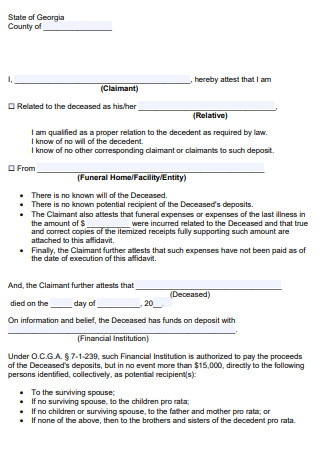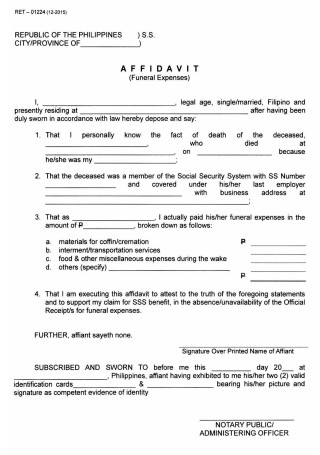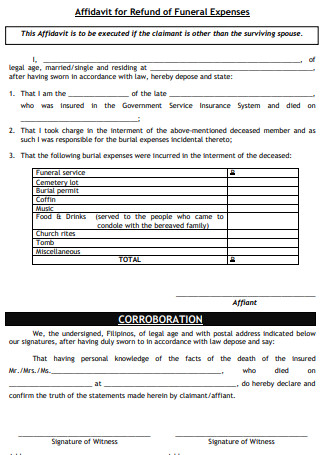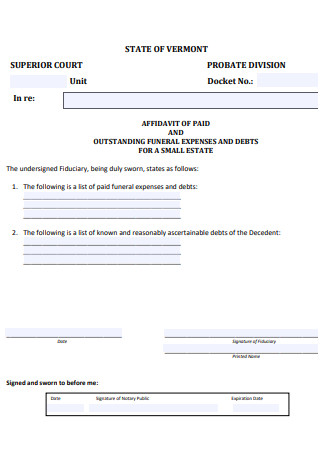3+ SAMPLE Affidavit of Funeral Expense
FREE Affidavit of Funeral Expenses s to Download
3+ SAMPLE Affidavit of Funeral Expense
What are Funeral Expenses?
Benefits of Selecting a Conventional Funeral Service
Types of Funerals
How to Plan a Funeral
FAQs
What is the least expensive method of burial?
Who pays for a funeral?
Do you take money to a funeral?
What are Funeral Expenses?
Funeral costs are the charges associated with planning and conducting a funeral. This insurance is made to pay for funeral costs if the insured individual dies. Until the full benefit is processed, the policyholder’s widow or partner may receive a portion of the user in advance for funeral cost estimates. Funerals support a crucial aspect of mourning because they reaffirm that the death has occurred. A funeral offers a safe and appropriate setting to express and share our feelings with others. We need to enable our grief to come to the surface. The groundwork for “good sorrow” or healthy grieving is laid here.
Benefits of Selecting a Conventional Funeral Service
You want to give them the proper farewell when a loved one dies. There are many alternatives, but a traditional funeral service is often the best choice for those who wish to honor and celebrate the life of a deceased loved one. With a standard service, everyone can say their final farewells before the dead are laid to rest. However, there is more to the story. Let’s examine the five advantages of a traditional burial in greater detail.
Types of Funerals
What type of funeral should I plan for a close acquaintance or relative? “Will my selection accommodate their religious needs?” Where should the ceremony be held? What are the differences between different forms of funerals? These are concerns that many people have about funerals, and we will help you find the answers. Among the most prevalent types of funerals are the following:
1. Full-Service Funeral
In most cultures, a full funeral service, also known as a “traditional” or “full service” funeral, is the most prevalent type. This typically occurs at a church or funeral facility within days of the decedent’s passing. Friends and family gather to observe the deceased at an open-casket or closed-casket ceremony. Due to the often religious nature of a complete service funeral, a pastor or priest will share a few words and a blessing. Family members or close acquaintances may then deliver one or more eulogies. Following the conclusion of the legal service, the attendants will proceed to the cemetery or crematorium to pay their final respects and complete the ceremony. The deceased’s family occasionally hosts a reception in their residence after the burial or cremation. This is not required for a full-service funeral and will depend on the preferences and circumstances of the family.
2. Graveside Service
A graveside service is the portion of the ceremony that follows the full or traditional service funeral described above; however, some families choose to skip the church service in favor of the graveside procedure alone. This may be a suitable alternative if neither the deceased nor their family are religious. With this option, the entire funeral ceremony is held at the cemetery or crematorium, where the funeral director and family and friends can deliver eulogies. Typically, a supplication is recited, and attendees place flowers or other mementos on the deceased’s grave.
3. Visitation or Viewing service
Those who choose an open-casket funeral have a viewing service, while those who prefer a closed-casket interment or cremation have a visitation service. The viewing or visitation service occurs before the full formal service and is typically reserved for close friends and family to convey condolences and say their final farewells. This ritual is the most personal and can provide solace to the most afflicted individuals. Any religious denomination may observe viewings and visits at the church, funeral home, cemetery, crematorium, or residence of the deceased.
4. Memorial Service
The purpose of a memorial service, also known as a “celebration of life,” is to commemorate and honor the deceased in a positive, less formal manner. One of the essential distinctions between a commemorative service and a full graveside or visitation service funeral is that the deceased’s body is not required to be present. However, it can be if the family chooses. And because the loved one’s remains are unnecessary, the ceremony can occur anytime after death. Location is another significant distinction between a memorial service and other funerals. This celebration can be held anywhere the family chooses, including their residences, an event venue, or a place the deceased cherished. If your dead friend or relative chose cremation, you might disperse their ashes in a predetermined location or one significant to them. This ceremony can occur during the memorial service. A memorial service may include food, drink, merriment, and the solemn sharing of the deceased’s life stories. Therefore, if you wish to memorialize your loved ones by recalling the finest aspects of their lives, a celebration of life may be the best funeral type for you.
How to Plan a Funeral
Planning a funeral at a time when emotions are already elevated can be overwhelming and stressful. This step-by-step guide to funeral planning is intended to simplify the process. Below you’ll find information on getting begun, selecting a funeral director, obtaining a financial advisor proposal, and planning the wake, among other topics. If you’re still intrigued, here are some funeral preparation steps.
1. Start Planning
People may leave instructions in their will or funeral plans or have discussed it with a close friend. Don’t fret if the deceased left funeral instructions, but they are impractical or unaffordable. Just concentrate on what you can do with the available fund fact sheet. Talk with family members and close acquaintances about funeral preparations. While some individuals may be unable to assist, others may wish to be involved in funeral arrangements. This support can make things less demanding, whether you delegate the task list to others or solicit their opinion. Don’t forget that you don’t have to wait until the individual has died to begin funeral planning. Having “the funeral conversation” can be consoling for those nearing the end of their lives, as it allows them and their loved ones to have peace of mind. You can also employ a funeral director to assist with preparations. They will walk you through the entire procedure in detail.
2. Selecting a Mortuary Superintendent
When planning a funeral, the first decision is whether a funeral director is required. As this is a challenging period, most individuals delegate funeral arrangements to a funeral director. They can handle the deceased, the proceedings, and the planning of any festivities. In addition, they can provide you with general advice and support. If your deceased loved one had a funeral plan, funeral insurance, or a will, they might already have selected a funeral director. If not, inquire around or consult the National Association of Funeral Directors for recommendations. A funeral director is not required to create an action plan for the entire funeral. Still, they are responsible for ensuring the deceased is cared for and treated with respect and dignity. Handling specific details on your own may be more cost-effective at such a difficult time, but a funeral director could be a great resource.
3. Select Either a Burial or Cremation
Burials, cremations, and direct cremations are the most typical forms of funerals. Prices can vary significantly between various options. A burial is typically the most expensive form of disposition, while direct cremation generally is the least costly. Your loved one may have requested a particular service in a funeral plan or will. But if you can’t afford it, don’t fret; select one that fits your budget. There are numerous varieties of coffins from which to choose. Before making a decision, it can be helpful to research what is available online. Typically, coffins are manufactured from solid wood, chipboard, metal, cardboard, or other biodegradable materials. Occasionally, images can also be used to personalize coffins. To ensure you purchase a suitable coffin, you must know the deceased’s height and weight. If you have access to a funeral director, they can demonstrate their selection of caskets. However, you are not required to get order forms to purchase the coffin from them.
4. Estimate the Expense of the Funeral
If the deceased had a funeral plan or insurance incident report, their policy might cover the funeral. They may have also had a life insurance policy that could have contributed to funeral expenses. Or they had sufficient funds in their estate to handle it. If so, the estate executor will pay for the funeral expenses. In most cases, a relative or close friend pays for a funeral. If this occurs, the friend or relative may be able to recover funeral expenses from the decedent’s estate, assuming there are sufficient funds. Use our free funeral budget calculator to estimate how much a basic funeral might cost.
FAQs
What is the least expensive method of burial?
Direct cremation is the least expensive method of burial. It is done respectfully and allows you and your family time to determine the most appropriate and cost-effective burial option.
Who pays for a funeral?
Occasionally, the deceased has already paid for their funeral. Or they have sufficient funds in their estate to cover the cost. If so, the estate executor will pay for the funeral expenses. Otherwise, a relative or close friend typically pays for the funeral.
Do you take money to a funeral?
Money is not a suitable present, although exceptions may be made if the family is in a dire financial budget plan. In such a case, friends may desire to pool funds to make a charitable contribution.
We are constantly reminded of the significance of planning, even in mortality. While it is true that you cannot carry anything with you to the afterlife, this also means that you will leave behind loved ones. Download our free, editable, printable Affidavit of Funeral Expenses samples to alleviate this burden immediately!




